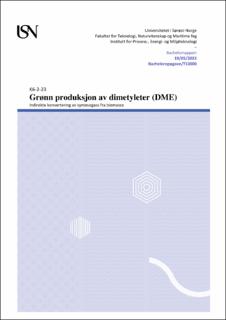Grønn produksjon av dimetyleter (DME) – Indirekte konvertering av syntesegass fra biomasse
Bachelor thesis
Published version
Permanent lenke
https://hdl.handle.net/11250/3121693Utgivelsesdato
2023Metadata
Vis full innførselSamlinger
Sammendrag
Dimethyl ether (DME) and other synthetic fuels are essential for the transition to a fossil-free
transport sector. DME brings with it several advantages in today´s infrastructure and is well comparable
with diesel in existing combustion engines. It will require 1.74 times as much liter DME to
drive the same distance as with diesel. However, a mixture of DME and diesel will reduce greenhouse
gas emissions and range. DME can be produced from synthesis gas via gasification of carbonneutral
resources such as biomass and is then a green alternative. The synthesis gas can be used to
produce DME directly in a one-step process (direct conversion), or via methanol in a two-step process
(indirect conversion). In this bachelor´s thesis, the process simulations in Aspen Hysys DME
synthesis from methanol have been studied. The task in the study involved assessment of process
design, process- and energy optimization, as well as cost estimation of DME synthesis. It started
with a sensitivity analysis that contained evaluation of operating parameters such as pressure and
temperature, as well as reactor design. Furthermore, the thermodynamic models (PRSV, NRTL,
UNIQUAC and Wilson) in Aspen Hysys were simulated and compared. Then energy optimization
of the process was carried out with internal heat integration and external heat transfer in the form of
cooling water and steam. Finally, cost estimation of "base case", parameter and energy optimization
were carried out.
Before the profitability analysis, the project had a capital expenditure (CAPEX) of 1.8 million USD,
operating expenses (OPEX) of 58.6 million USD and revenue of 54.3 million USD. However, profitability
and operating expenses depend on the price of DME and methanol. The results from the
optimization gave higher DME flow (0.5 %), lower energy demand (-46 %), lower OPEX (-11 %)
and CAPEX (-4 %), as well as higher income (0.5 %) compared to "base case".
